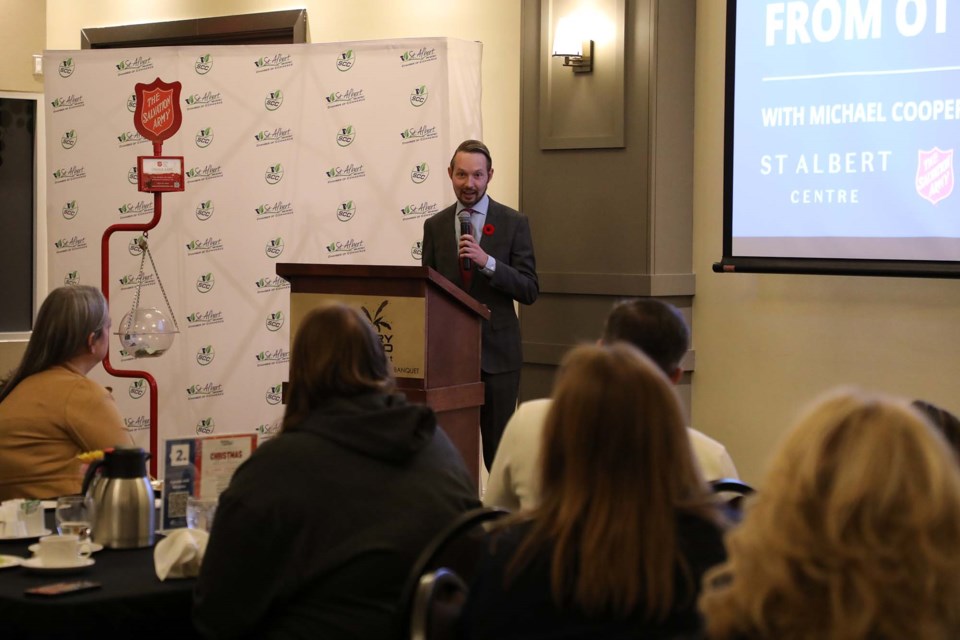A St. Albert member of Parliament addressed the city's business community on Wednesday.
Michael Cooper was the keynote speaker at the St. Albert and District Chamber of Commerce’s Business@Lunch event on Nov. 9.
"The theme of today is an ‘Update from Ottawa,’ and it goes without saying that there's no shortage of issues to tackle,” he said.
Cooper discussed his activities in Parliament this year, including championing a bill to support jurors' mental health, his new role in the shadow cabinet, his work on the Special Joint Committee on Medical Assistance in Dying, and the state of inflation in Canada.
The House of Commons resumed sitting on Sept. 19, and it started with a legislative victory for Cooper when a bill he championed finally passed, after dying on the order paper on three previous tries.
On Sept. 28, Bill S-206 — an act to amend the Criminal Code (disclosure of information by jurors) — was unanimously adopted in the House of Commons. The bill was introduced by Conservative Sen. Pierre Boisvenu on Nov. 24, 2021, and was sponsored by Cooper.
The bill allows people who have mental health issues resulting from jury duty to disclose jury deliberation information to a health professional.
“I've got to tell you that it's not easy to pass a private member's bill … despite the fact that it has received unanimous support at all legislative stages, it still took four years, four bills and three Parliaments,” he said.
Cooper was appointed as shadow minister for democratic reform at the beginning of October.
He said he wouldn’t fault anyone for scratching their head over the meaning of the role, but that it pertains to all issues related to elections and how to help Parliament become more democratic.
“Fundamental to our democracy is that Canadians and Canadians alone should be the deciders of the outcome of elections,” he said.
Inspired by a recent Global News report, Cooper said he sent a multi-party signed letter to the clerk of the Standing Committee on Procedure and House Affairs on Nov. 9, asking for an emergency meeting to study interference from the Chinese Communist Party in the 2019 Canadian election.
“So that we can expand the study, call appropriate witnesses, hear from the agencies. So that we can address vulnerabilities with respect to mechanisms that are in place to protect our democracy, and I hope come back with recommendations that are supported by all parties to ensure that our security intelligence and law enforcement agencies have the tools and resources that they need to stop and prevent foreign interference,” he said.
Cooper also leads the Joint Special Committee on Medical Assistance in Dying (MAiD) file for the Conservatives.
“It's a very challenging file. It's incredibly complex. It's one that I've been involved in — in some ways uniquely as a member of Parliament, in that I'm the only member of Parliament that has been on all the committees that have studied this issue from day one,” he said.
Cooper said there are two issues with regard to MAiD that concern him: mental illness as a sole underlying condition, and “vulnerable people falling through the cracks.”
The committee will table a report in February.
Cooper then spoke about inflation and the economy.
“We are living at a time of 40-year high inflation. Canadians are hurting, many Canadians are hurting; 1.5 million Canadians a month go to a food bank. One in five Canadians are cutting back on meals every day. How do we get into this? … it's a big question,” he said.
Cooper said the federal government has a spending problem and the federal government has added fuel to the inflationary fire by increasing the carbon tax.
Cooper suggests the federal government needs to show fiscal responsibility, scrap regulations surrounding the “no pipeline bills,” streamline environmental assessments, and remove red tape on Canadian oil and gas.
There were two questions from the audience.
One person asked Cooper where he thinks the federal government gets its advice.
“It's a good question. I wish I knew the answer to that. But whoever they're getting advice from, it's bad advice, and we need to change course,” he responded.
St. Albert Public Library CEO Peter Bailey wanted clarity on Cooper's position on the carbon tax, after the provincial and federal government announced $476 million funding for a blue-hydrogen plant.
“Apparently it is going to be the largest NetZero hydrogen plant in the world, bringing thousands of jobs to the Edmonton area, including St. Albert. That $476 million is composed of funding from the provincial large emitter carbon tax and the federal carbon tax. So, I'm wondering your view on that, that the carbon taxes are doing good things?” Bailey asked.
Cooper said emissions have gone up under this government.
“The carbon tax is just another tax. And it's burdensome. And it hasn't worked,” he said.




